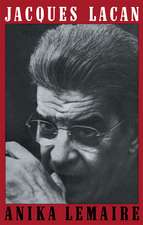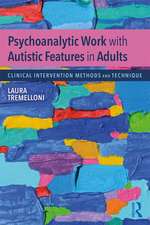The Meaning of Movement: Embodied Developmental, Clinical, and Cultural Perspectives of the Kestenberg Movement Profile
Editat de Janet Kestenberg Amighi, Susan Loman, K. Mark Sossinen Limba Engleză Paperback – 30 mai 2018
| Toate formatele și edițiile | Preț | Express |
|---|---|---|
| Paperback (1) | 447.84 lei 6-8 săpt. | |
| Taylor & Francis – 30 mai 2018 | 447.84 lei 6-8 săpt. | |
| Hardback (1) | 1032.66 lei 6-8 săpt. | |
| Taylor & Francis – 16 mai 2018 | 1032.66 lei 6-8 săpt. |
Preț: 447.84 lei
Preț vechi: 471.41 lei
-5% Nou
Puncte Express: 672
Preț estimativ în valută:
85.70€ • 91.64$ • 71.45£
85.70€ • 91.64$ • 71.45£
Carte tipărită la comandă
Livrare economică 17 aprilie-01 mai
Preluare comenzi: 021 569.72.76
Specificații
ISBN-13: 9781138484634
ISBN-10: 1138484636
Pagini: 380
Ilustrații: 15 Tables, black and white; 24 Line drawings, black and white; 16 Halftones, black and white; 40 Illustrations, black and white
Dimensiuni: 152 x 229 x 27 mm
Greutate: 0.51 kg
Ediția:2 ed
Editura: Taylor & Francis
Colecția Routledge
Locul publicării:Oxford, United Kingdom
ISBN-10: 1138484636
Pagini: 380
Ilustrații: 15 Tables, black and white; 24 Line drawings, black and white; 16 Halftones, black and white; 40 Illustrations, black and white
Dimensiuni: 152 x 229 x 27 mm
Greutate: 0.51 kg
Ediția:2 ed
Editura: Taylor & Francis
Colecția Routledge
Locul publicării:Oxford, United Kingdom
Public țintă
Postgraduate, Professional, and Professional Practice & DevelopmentCuprins
Preface. Section I: The Kestenberg Movement Profile Explained. Introduction. 1. Tension Flow Rhythms 2. Tension Flow Attributes 3. Precursors of Effort (Commonly Referred to as Pre-Efforts) 4. Efforts 5. Bipolar Shape Flow 6. Unipolar Shape Flow 7. Shape Flow Design 8. Shaping in Directions 9. Shaping in Planes Section II: Clinical and Research Applications. 10. Clinical Contributions Employing the Kestenberg Movement Profile (KMP) 11. KMP of Joey and Dance/Movement Therapy (DMT) Clinical Applications 12. Musings on Theoretical and Research Contributions of the KMP Within the Context of Nonverbal Studies. Section III: Interpreting the KMP 13. Reviewing the Body Attitude and Interpreting Movement Patterns through KMP Diagrams
Notă biografică
Janet Kestenberg Amighi, PhD, MSS, MLSP, has a doctorate in anthropology and graduate degrees in social work and social policy. She serves as President of Child Development Research. She authored The Zoroastrians of Iran and numerous journal articles. The daughter of Judith Kestenberg, she has co-taught the KMP at the Laban/Bartenieff Institute for Movement Studies, Drexel University, and Allameh Tabataba’i University in Iran.
Susan Loman, MA, BC-DMT, NCC, Professor Emerita and former Director of the MA Program in Dance/Movement Therapy and Counseling, Antioch University New England, is a board-certified member of the American Dance Therapy Association and a National Certified Counselor.She also served as co-editor of the American Journal of Dance Therapy.
K. Mark Sossin, PhD, Professor of Psychology at Pace University, is a clinical psychologist, researcher, and psychoanalyst with particular interests in infancy, psychotherapeutic methods, psychopathology, autism, family systems, trauma and its transmission, and movement/nonverbal behavior. He directs the Laboratory of Mind, Movement, Interaction, and Development.
Susan Loman, MA, BC-DMT, NCC, Professor Emerita and former Director of the MA Program in Dance/Movement Therapy and Counseling, Antioch University New England, is a board-certified member of the American Dance Therapy Association and a National Certified Counselor.She also served as co-editor of the American Journal of Dance Therapy.
K. Mark Sossin, PhD, Professor of Psychology at Pace University, is a clinical psychologist, researcher, and psychoanalyst with particular interests in infancy, psychotherapeutic methods, psychopathology, autism, family systems, trauma and its transmission, and movement/nonverbal behavior. He directs the Laboratory of Mind, Movement, Interaction, and Development.
Recenzii
"The Meaning of Movement advances the KMP’s importance for developmental psychology, clinical and therapeutic practice. It will be rewarding reading for psychologists, therapists, scholars, and scientists seeking understanding of the nature of human movement as expressive gesture. It provides sensitively observed structure to an account of the affective and embodied mind."
Dr Jonathan Delafield-Butt, Reader in Child Development and Director of the Laboratory for Innovation in Autism, University of Strathclyde
"Kestenberg Amighi, Loman and Sossin have made the complexity of the movement-psyche correlation greatly accessible, particularly through their multiple examples and short exercises that are intermingled with the scholarly description of the system. The compelling theory and method of the KMP broadens our awareness of the intricate relation of body and mind. A must have for any book shelf."
Dr. phil. habil. Sabine C. Koch, M.A., BC-DMT, psychologist and dance movement therapist, Head of the dance movement therapy master program at SRH University Heidelberg; Director of the Research Institute for Creative Arts Therapies, Alanus University, Germany.
"In human interactions, communication occurs not only with words but with a variety of non-verbal communications, such as facial expressions, gestures, postures, and complex bodily movements. Parents, educators, and mental health professionals often do not appreciate that there may be a discordance between the words that are used and the subliminal non-verbal communication. The Kestenberg Movement Profile (KMP) is a valuable tool to broaden the understanding of human interactions. Kestenberg Amighi, Loman, and Sossin are to be congratulated."
Leon Hoffman, MD, Co-Director Pacella Research Center of the New York Psychoanalytic Society and Institute
"The Meaning of Movement offers a rich, invaluable approach to understanding nonverbal communication through The Kestenberg Movement Profile (KMP). Unlike the analysis of face-to-face communication in infant research, the KMP includes all aspects of nonverbal behavior, including gestures, postures, full body motions, muscle tension levels, the shapes of each person’s body, and how each partner navigates personal space and shared dyadic space. These perspectives provide remarkable avenues into relational dynamics at every stage of development."
Beatrice Beebe, PhD, Clinical Professor of Medical Psychology, Columbia University Medical Center
Dr Jonathan Delafield-Butt, Reader in Child Development and Director of the Laboratory for Innovation in Autism, University of Strathclyde
"Kestenberg Amighi, Loman and Sossin have made the complexity of the movement-psyche correlation greatly accessible, particularly through their multiple examples and short exercises that are intermingled with the scholarly description of the system. The compelling theory and method of the KMP broadens our awareness of the intricate relation of body and mind. A must have for any book shelf."
Dr. phil. habil. Sabine C. Koch, M.A., BC-DMT, psychologist and dance movement therapist, Head of the dance movement therapy master program at SRH University Heidelberg; Director of the Research Institute for Creative Arts Therapies, Alanus University, Germany.
"In human interactions, communication occurs not only with words but with a variety of non-verbal communications, such as facial expressions, gestures, postures, and complex bodily movements. Parents, educators, and mental health professionals often do not appreciate that there may be a discordance between the words that are used and the subliminal non-verbal communication. The Kestenberg Movement Profile (KMP) is a valuable tool to broaden the understanding of human interactions. Kestenberg Amighi, Loman, and Sossin are to be congratulated."
Leon Hoffman, MD, Co-Director Pacella Research Center of the New York Psychoanalytic Society and Institute
"The Meaning of Movement offers a rich, invaluable approach to understanding nonverbal communication through The Kestenberg Movement Profile (KMP). Unlike the analysis of face-to-face communication in infant research, the KMP includes all aspects of nonverbal behavior, including gestures, postures, full body motions, muscle tension levels, the shapes of each person’s body, and how each partner navigates personal space and shared dyadic space. These perspectives provide remarkable avenues into relational dynamics at every stage of development."
Beatrice Beebe, PhD, Clinical Professor of Medical Psychology, Columbia University Medical Center
Descriere
The new edition of The Meaning of Movement serves as a definitive guide to future instruction in the Kestenberg Movement Profile (KMP) and as the system’s foremost reference book, sourcebook, and as an authoritative compendium.









